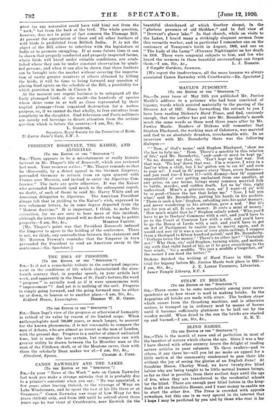MAULE'S JUDGMENT.
[To THE EDITOR OF THE " SPECTATOR."'
SIR,—In your issue of May 15th you published Mr. Justice Manle's address to a prisoner who had been convicted of bigamy, words which assisted materially to the passing of the Divorce Act of 1857. Since forwarding the extract to you I have been reading Dickens's Hard Times, and find, curiously enough, that the author has put into Mr. Bounderby's month much the same words as those used three years after by Mr. Justice Mauls. Readers of Dickens will remember that Stephen Blackpool, the working man of Coketown, was married and tied to an absolutely drunken, irreclaimable wife. In an interview with Mr. Bounderby there was the following dialogue :-
" Now, a' God's name,' said Stephen Blackpool, ' show me the law to help me.' Hem. There's a sanctity in this relation of life,' said Mr. Bounderby, and—and—it must be kept up.' No no, dunnot say that, sir. 'Tan't kept up that way. Not that way. 'Tis kep' down that way. I'm a weaver, I were in a fact'ry when a chilt, but I ha' gotten een to see wi' and eern to year wi'. I read in th' papers every 'Sizes, every Sessions— and you read too—I know it!—with dismay—how th' supposed unpossibility o' ever getting unchained from one another, at any price, on any terms, brings many common married folk to battle, murder, and sudden death. Let us ha' this, right understood. Mine's a grievous case, an' I want—if yo' will lie so good—t'know the law that helps me.' Now. I tell you what,' said Mr. Bounderby, putting his hands in his pockets. There is such a law.' Stephen, subsiding into his quiet manner. and never wandering in his attention, gave a nod. But it's not for you at all. It costs money. It costs a mint of money.' ' How much might that be ?' Stephen calmly asked. Why,you'd have to go to Doctors' Commons with a suit, and you'd have to go to the Court of Common Law with a suit, and you'd have to go the House of Lords with a snit, and you'd have to get an Act of Parliament to enable you to marry again, and it would cost you (if it was a case of very plain-sailing), I suppose from a thousand to fifteen hundred pound,' said Mr. Bounderby. Perhaps twice the money.' There's no other law? " Certainly not.' Why then, sir,' said Stephen, turning white, and motion- ing with that right hand of his, as if he gave everything to the four winds, "tis a muddle. 'Tis just a muddle etoogether, an the sooner I am dead the better.' "
Dickens finished the writing of Hard Times in 1854. The trial for bigamy before Mr. Justice Manle took place in 1857.-






































 Previous page
Previous page